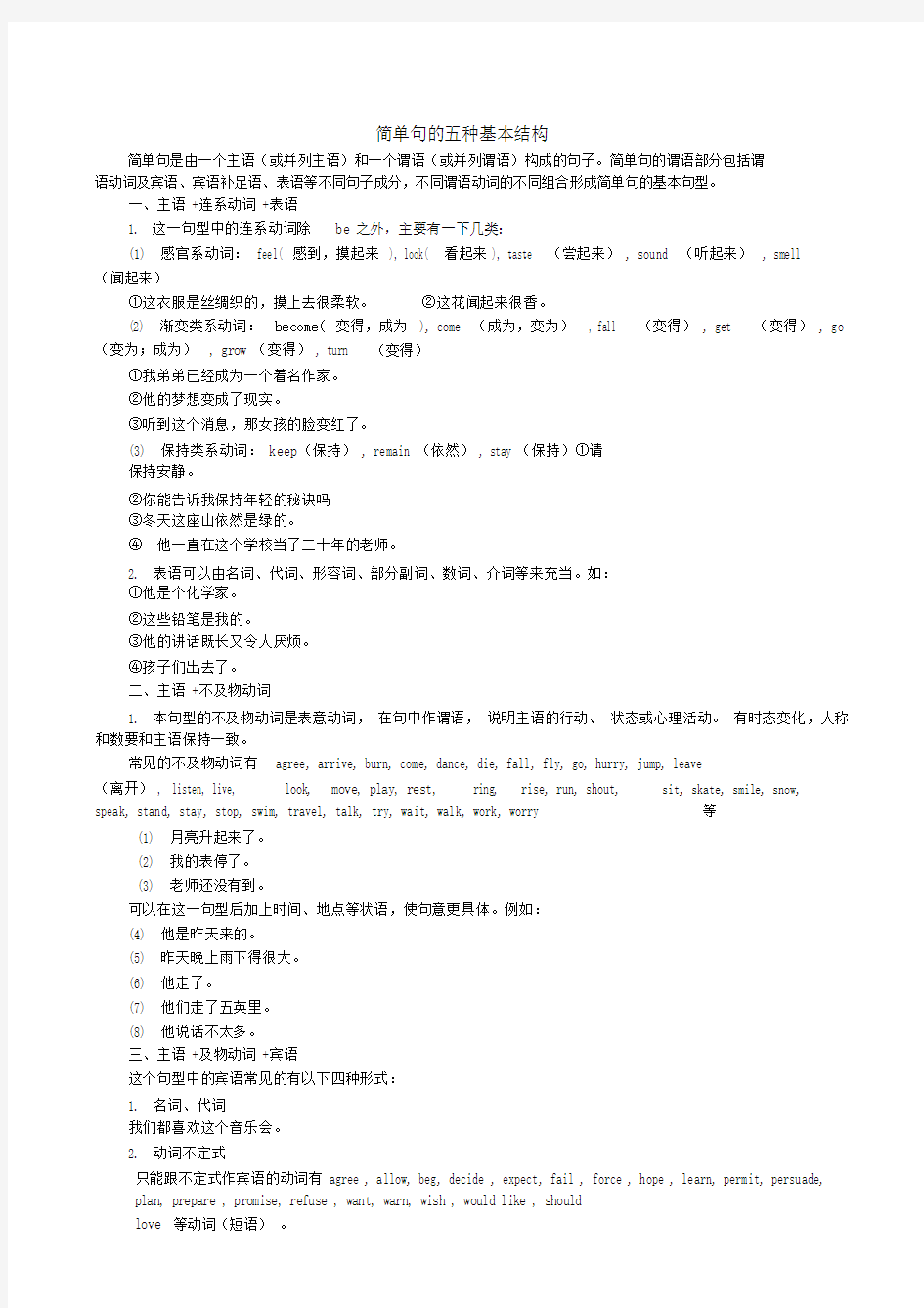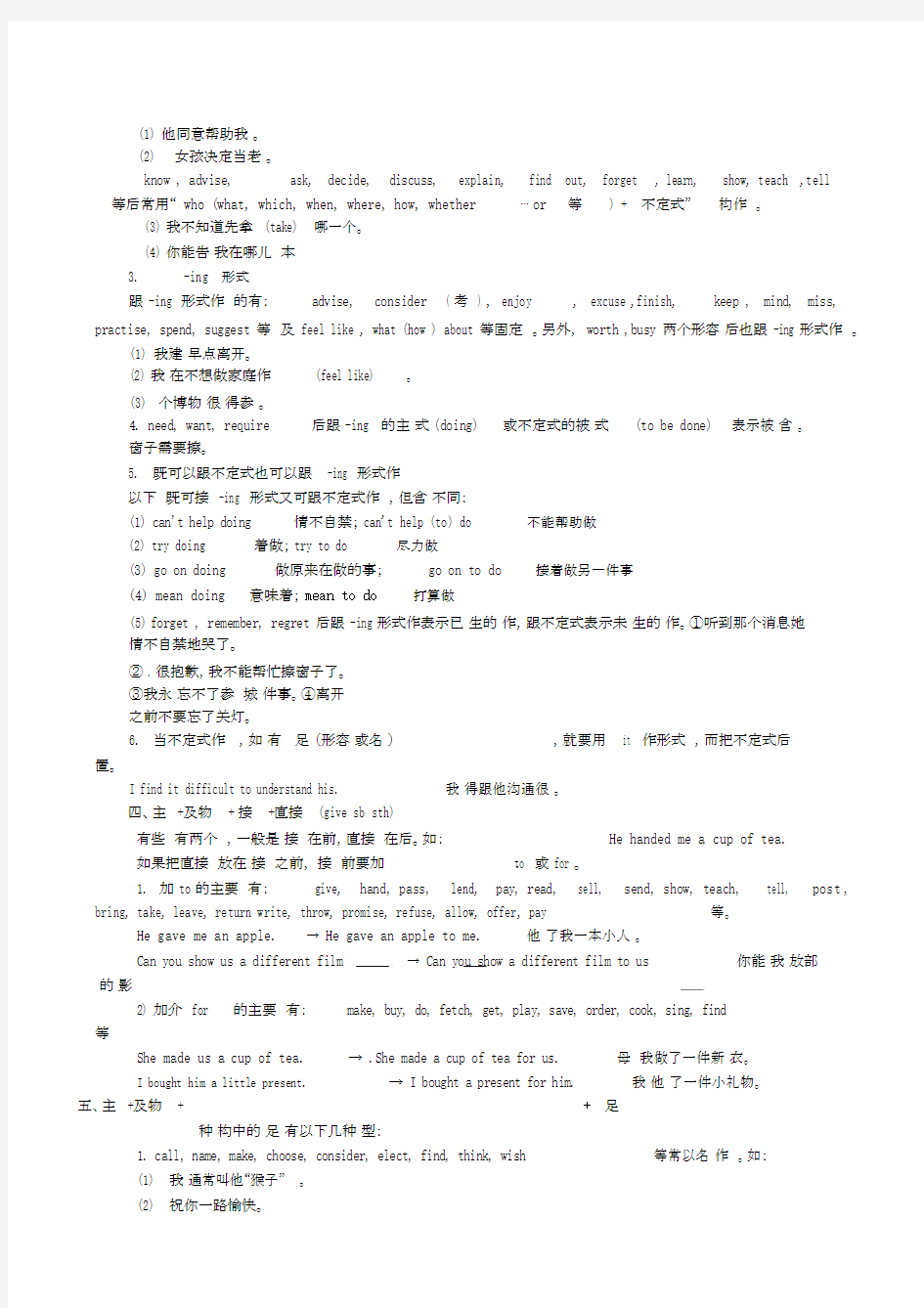

简单句的五种基本结构
简单句是由一个主语(或并列主语)和一个谓语(或并列谓语)构成的句子。简单句的谓语部分包括谓
语动词及宾语、宾语补足语、表语等不同句子成分,不同谓语动词的不同组合形成简单句的基本句型。
一、主语 +连系动词 +表语
1.这一句型中的连系动词除be 之外,主要有一下几类:
(1)感官系动词: feel( 感到,摸起来 ), look( 看起来 ), taste (尝起来) , sound (听起来) , smell
(闻起来)
①这衣服是丝绸织的,摸上去很柔软。②这花闻起来很香。
(2) 渐变类系动词:become( 变得,成为 ), come (成为,变为), fall(变得), get(变得), go (变为;成为), grow (变得) , turn(变得)
①我弟弟已经成为一个着名作家。
②他的梦想变成了现实。
③听到这个消息,那女孩的脸变红了。
(3)保持类系动词: keep(保持) , remain (依然) , stay (保持)①请
保持安静。
②你能告诉我保持年轻的秘诀吗
③冬天这座山依然是绿的。
④ 他一直在这个学校当了二十年的老师。
2.表语可以由名词、代词、形容词、部分副词、数词、介词等来充当。如:
①他是个化学家。
②这些铅笔是我的。
③他的讲话既长又令人厌烦。
④孩子们出去了。
二、主语 +不及物动词
1.本句型的不及物动词是表意动词,在句中作谓语,说明主语的行动、状态或心理活动。有时态变化,人称和数要和主语保持一致。
常见的不及物动词有 agree, arrive, burn, come, dance, die, fall, fly, go, hurry, jump, leave
(离开) , listen, live,look, move, play, rest,ring, rise, run, shout,sit, skate, smile, snow, speak, stand, stay, stop, swim, travel, talk, try, wait, walk, work, worry等
(1)月亮升起来了。
(2)我的表停了。
(3)老师还没有到。
可以在这一句型后加上时间、地点等状语,使句意更具体。例如:
(4)他是昨天来的。
(5)昨天晚上雨下得很大。
(6)他走了。
(7)他们走了五英里。
(8)他说话不太多。
三、主语 +及物动词 +宾语
这个句型中的宾语常见的有以下四种形式:
1.名词、代词
我们都喜欢这个音乐会。
2.动词不定式
只能跟不定式作宾语的动词有 agree , allow, beg, decide , expect, fail , force , hope , learn, permit, persuade, plan, prepare , promise, refuse , want, warn, wish , would like , should
love等动词(短语)。
(1)他同意帮助我。
(2)女孩决定当老。
know , advise, ask, decide, discuss, explain, find out, forget , learn, show, teach ,tell 等后常用“ who (what, which, when, where, how, whether?or等) +不定式”构作。
(3) 我不知道先拿 (take)哪一个。
(4) 你能告我在哪儿本
3.-ing形式
跟 -ing形式作的有:advise, consider ( 考 ) , enjoy , excuse ,finish,keep , mind, miss, practise, spend, suggest 等及 feel like , what (how ) about 等固定。另外, worth ,busy 两个形容后也跟 -ing 形式作。
(1)我建早点离开。
(2) 我在不想做家庭作(feel like)。
(3)个博物很得参。
4. need, want, require后跟-ing的主式(doing)或不定式的被式(to be done)表示被含。
窗子需要擦。
5.既可以跟不定式也可以跟 -ing 形式作
以下既可接 -ing 形式又可跟不定式作,但含不同:
(1) can't help doing情不自禁;can't help (to) do不能帮助做
(2) try doing着做;try to do尽力做
(3) go on doing做原来在做的事;go on to do接着做另一件事
(4) mean doing意味着;mean to do打算做
(5)forget , remember, regret 后跟 -ing 形式作表示已生的作,跟不定式表示未生的作。①听到那个消息她
情不自禁地哭了。
② . 很抱歉,我不能帮忙擦窗子了。
③我永忘不了参城件事。④离开
之前不要忘了关灯。
6.当不定式作,如有足(形容或名),就要用it作形式,而把不定式后
置。
I find it difficult to understand his.我得跟他沟通很。
四、主 +及物 +接 +直接 (give sb sth)
有些有两个,一般是接在前,直接在后。如:He handed me a cup of tea.
如果把直接放在接之前,接前要加to 或 for 。
1.加to的主要有:give, hand, pass, lend, pay, read, sell, send, show, teach, tell,post ,bring, take, leave, return write, throw, promise, refuse, allow, offer, pay等。
He gave me an apple.→ He gave an apple to me.他了我一本小人。
Can you show us a different film→ Can you show a different film to us你能我放部
的影
2) 加介 for的主要有:make, buy, do, fetch, get, play, save, order, cook, sing, find
等
She made us a cup of tea.
I bought him a little present.→ .She made a cup of tea for us.母我做了一件新衣。
→ I bought a present for him.我他了一件小礼物。
五、主 +及物 ++足
种构中的足有以下几种型:
1. call, name, make, choose, consider, elect, find, think, wish等常以名作。如:
(1)我通常叫他“猴子” 。
(2)祝你一路愉快。
2. believe, color, consider,find, get , keep, leave, make, turn, push, tear, prove , set ,think等动词后常跟形容词作宾补。
(1) 你认为 (believe/think/consider)约翰错了吗
(2)我不认 (consider) 为他是我的朋友。
(3)好的食物使你保持健康。
3. ask, allow, beg, call on, cause, consider invite, like, order, tell, wish, would like
不定式前加not或never。
(认为)
等动词要以带
encourage, expect, force, get, hate,
to 的不定式作宾补。不定式的否定式是在
(1) 我父母不允许我很晚不归(stay out late)。
(2)什么使你这么想的
(3)他父亲告诉他不要玩火。
注意:汉语中人们常用“希望某人做某事”这样的结构,所以在学英语时,就常写出I hope you to come
a little earlier.这样错误的句子。正确的表达应是:
4.一感(feel),二听(hear,listen to ),
三让(I hope you will come a little earlier.
have, let,make),四看( look at,notice,see,
watch )这些动词后常跟不带的不定式作宾补。
(1)她不回让我们走的。
(2)老板注意到两个工人离开了车间。
注意: (1)上述动词后跟不带to的不定式作宾补时,如变为被动语态,则不定式符号to不能省略。如:
Something was heard to fall onto the ground.听见有个什么东西掉到地上。
(2) 感观动词后跟不定式作宾补表示的动作已完成,跟动词的-ing形式表示正在进行。试比较:
①老师看见女孩的脸变红了。
②我来到教室时听见他们在唱歌。
练习:
1. They are considering _____the house before the prices go up.
A. of buying
B. with buying
C. buying
D. to buy
2. ---To buy that old car means _____a lot of money. ---Really I don’ t mean _____much money.
A. to waste; to waste
B. wasting; to waste
C. wasting; wasting
D. to waste;
wasting
3. Though he had often made his little sister ____, today he was made ____ by his little sister.
A. cry; to cry
B. crying; crying
C. cry; cry
D. to cry; cry
4. The Internet _____it easy to get much new information in a short time.
A. finds
B. makes
C. feels
D. takes
5. Could you lend your radio _____me tomorrow, Joan Mine is broken. A. to B. for C. at
D. in
6. ----Please wait here. I’ll come back soon.----All right. We
_____you come back.
A. stay; until
B. get; till
C. stay at ; till
D. wait for; until
7. .----I tried to make Kate ______ her mind, but I found it hard .
---Well, I saw you_______ that when I went past.
A. change, do
B. changes, doing
C. to change, do
D. change , doing
8. Everyone must _______ their hands _______ .
A. kept, cleanly
B. keeps, clean
C. keep, clean
D. keep, cleaning
9. Ron ______ Henry to help him with his biology.
10. He told me _______ bring you anything. A. not to B. to not C. not ’ll _____the library
D. don’t
11.Your hair wants _____. You’ d better have it done tomorrow.
A. cutting
B. to cut
C. cut
D. being cut
12.I heard Mother _______ with Father in the next room at ten last night.
A. talk
B. talking
C. to talk
D. is talking
13.The dog was ______ the next morning. A. found die B. found dying C. found dead D.
found death
14.--- Do you often hear John _____ in his room
----Listen! Now we can hear him _____ in his room.
A. sing; to sing
B. singing; singing
C. to sing; singing
D. sing; singing
’ m trying to remember the phone number. --- Why don’ t you _____in the phone book
A. look up it
B. look it
C. look it up
D. look up
16. She didn’ t remember ______him before. A. to have met B. to meet C. having met D.
to having met
17. I don’t feel _____going out for a walk now. A. interested B. happy C. excited
D. like
18. The boss promised to ____the worker’ s payment(工资).
A. rise
B. lift
C. raise
D. wait
19. He sent ______. A. some cards his friends B. to his friends some cards
C. his friends some cards
D. his friends to some cards
20. ---Jack spends too much time reading. --- _____him read if he wants to.
A. Let her
B. Ask
C. Allow
D. Make